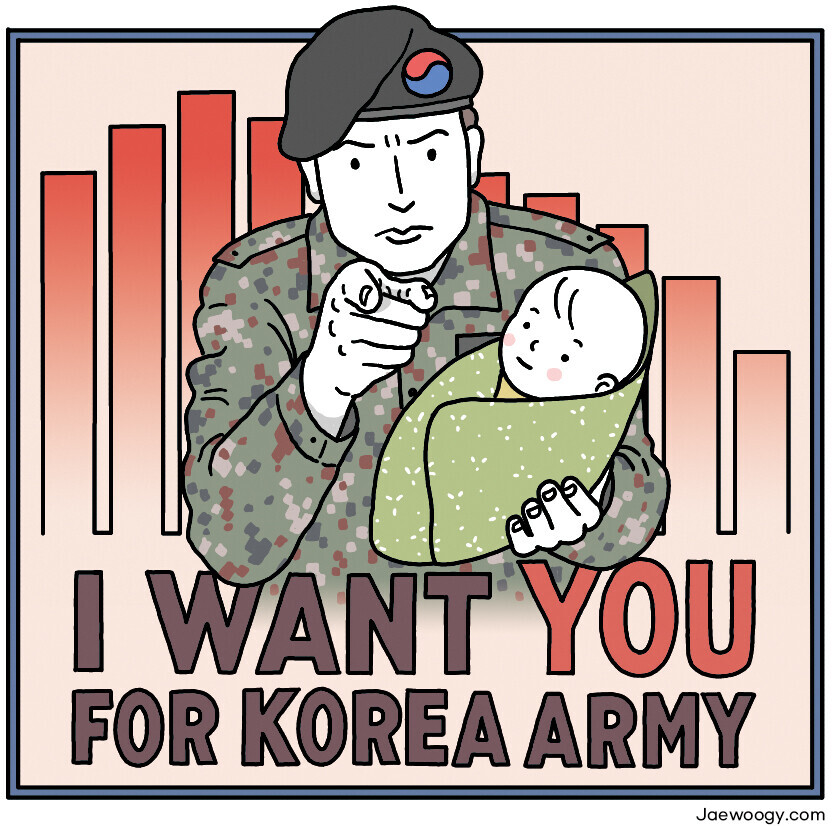hankyoreh
Links to other country sites 다른 나라 사이트 링크
[Column] Will Korea finally do away with military conscription?

The Western-style conscription system is a product of modernity that appeared after the French Revolution. Before then, war was undertaken by a small number of aristocrats and mercenaries. However, with the advent of the modern nation state and the institutionalization of standing armies, countries started mandating military service of all citizens who were physically fit and met certain age criteria in order to build their military manpower.
Conscription as a system did not merely prepare a country for war. It was a method through which the nation instilled the modern way of life and national ideology into the mobilized while molding their identity as citizens of a state. But with the end of the Cold War and the decline of military conflict, many countries that previously adopted a mandatory military system are now switching over to a volunteer military system.
A South Korean broadcasting company recently recategorized the military systems of countries around the world reported in the World Factbook produced by the US’ Central Intelligence Agency; according to the tally, 66 nations currently subscribe to a compulsory military service system while 121 nations subscribe to a voluntary one.
Despite this worldwide trend towards an all-volunteer military system, South Korea, with its history of war and military confrontation with North Korea, has been slow to follow suit. While discussions of a transition to a voluntary military system began at the turn of the millennium, when reconciliation with North Korea became more popular and a call for a smaller, more high-tech military surfaced, naysayers successfully stifled these conversations by arguing that South Korea needed an army of at least half a million in order to counter North Korea’s army of 1.2 million. Some also pointed out that a volunteer military system would result in a “military of the poor,” as the wealthy would avoid serving armed forces.
But change might be in the air. Since Justice Party presidential candidate Sim Sang-jung announced a “Korean-style volunteer military system” as one of her platforms on Nov. 15, Democratic Party presidential nominee Lee Jae-myung has followed suit and promised to adopt an “optional volunteer military system” if elected.
While Sim’s plan aims for a complete shift to a volunteer military system by 2030 following a transitional period that combines both a mandatory and voluntary military system, Lee’s proposal will reduce the size of the conscript army to 150,000 soldiers — half the current figure — while adding 50,000 professional non-commissioned officers and 50,000 civilian employees through volunteer recruitment.
Hong Joon-pyo, who previously vied for the People Power Party’s presidential nomination, was also a proponent of a volunteer military system.
The current change in the climate surrounding South Korea’s military system is not necessarily related to conversations about disarmament or pacifism. It is more a result of the decrease in the number of conscription-age individuals, which has made it difficult for the South Korean government to maintain its military at its current level. Moreover, wages for enlisted soldiers have steadily increased, making the cost-cutting effects of a mandatory military system no longer significant.
No lofty ideal can match the urgency of the reality that there are not enough people to serve in the military in South Korea. The crisis of the impending “demographic cliff” may be a game changer for the future of South Korea’s military system.
By Lee Se-young, editorial writer
Please direct questions or comments to [english@hani.co.kr]

Editorial・opinion
![[Column] The state is back — but is it in business? [Column] The state is back — but is it in business?](https://flexible.img.hani.co.kr/flexible/normal/500/300/imgdb/original/2024/0506/8217149564092725.jpg) [Column] The state is back — but is it in business?
[Column] The state is back — but is it in business?![[Column] Life on our Trisolaris [Column] Life on our Trisolaris](https://flexible.img.hani.co.kr/flexible/normal/500/300/imgdb/original/2024/0505/4817148682278544.jpg) [Column] Life on our Trisolaris
[Column] Life on our Trisolaris- [Editorial] Penalties for airing allegations against Korea’s first lady endanger free press
- [Editorial] Yoon must halt procurement of SM-3 interceptor missiles
- [Guest essay] Maybe Korea’s rapid population decline is an opportunity, not a crisis
- [Column] Can Yoon steer diplomacy with Russia, China back on track?
- [Column] Season 2 of special prosecutor probe may be coming to Korea soon
- [Column] Park Geun-hye déjà vu in Yoon Suk-yeol
- [Editorial] New weight of N. Korea’s nuclear threats makes dialogue all the more urgent
- [Guest essay] The real reason Korea’s new right wants to dub Rhee a founding father
Most viewed articles
- 1[Column] Why Korea’s hard right is fated to lose
- 2Amid US-China clash, Korea must remember its failures in the 19th century, advises scholar
- 3[Column] The state is back — but is it in business?
- 460% of young Koreans see no need to have kids after marriage
- 5Trump’s talk of flouting NATO promises sparks apprehension in Seoul
- 6New sex-ed guidelines forbid teaching about homosexuality
- 7South Korea officially an aged society just 17 years after becoming aging society
- 81 in 5 workers at mid- to large-size Korean companies already affected by AI
- 9[Column] Can Yoon steer diplomacy with Russia, China back on track?
- 10Presidential office warns of veto in response to opposition passing special counsel probe act